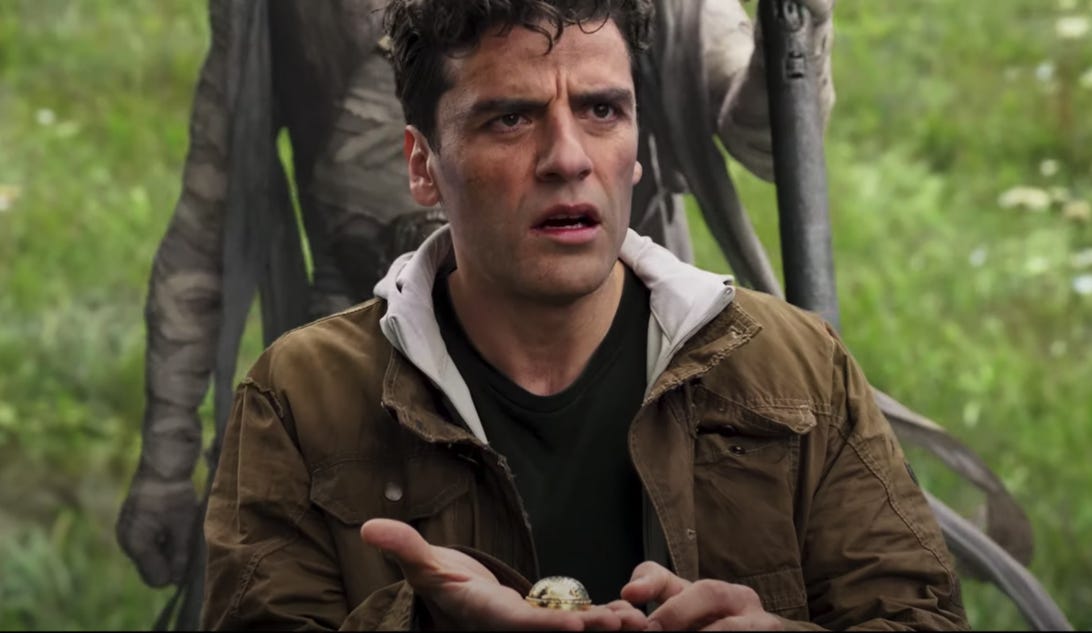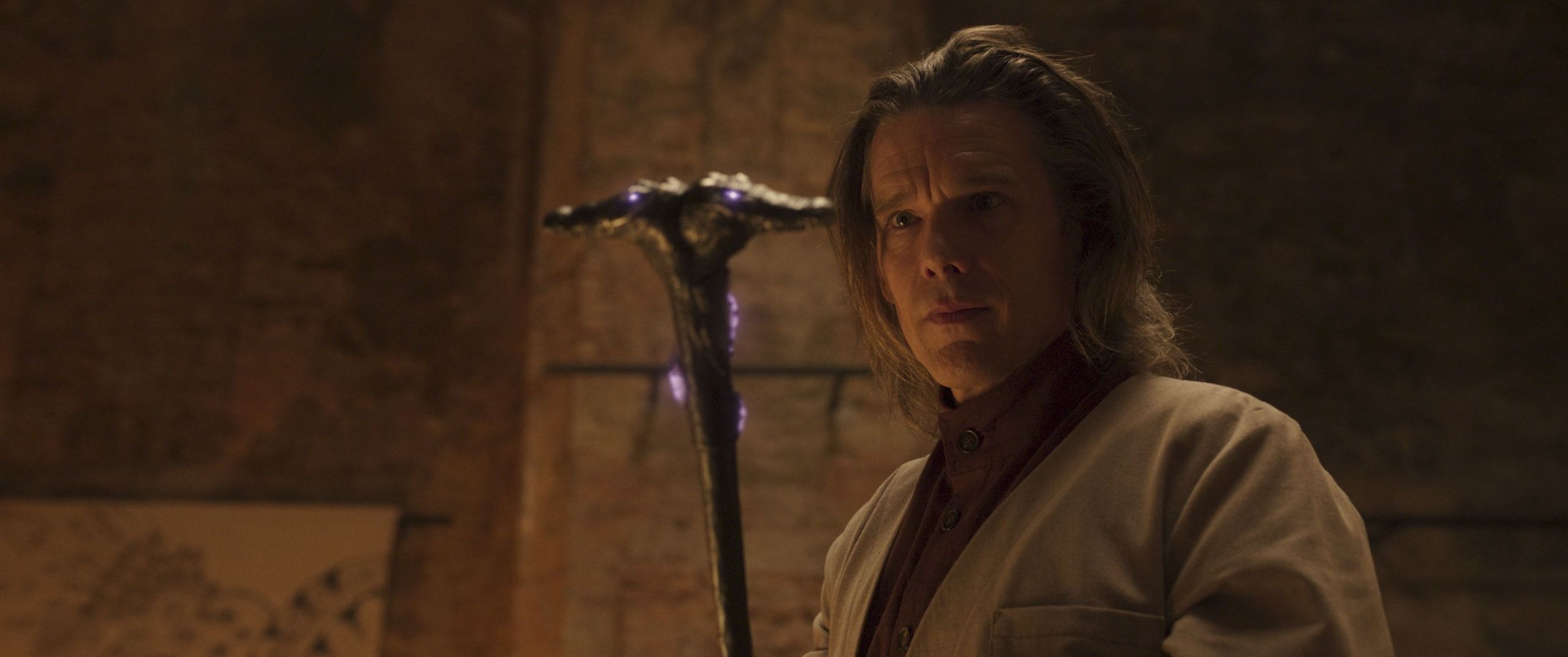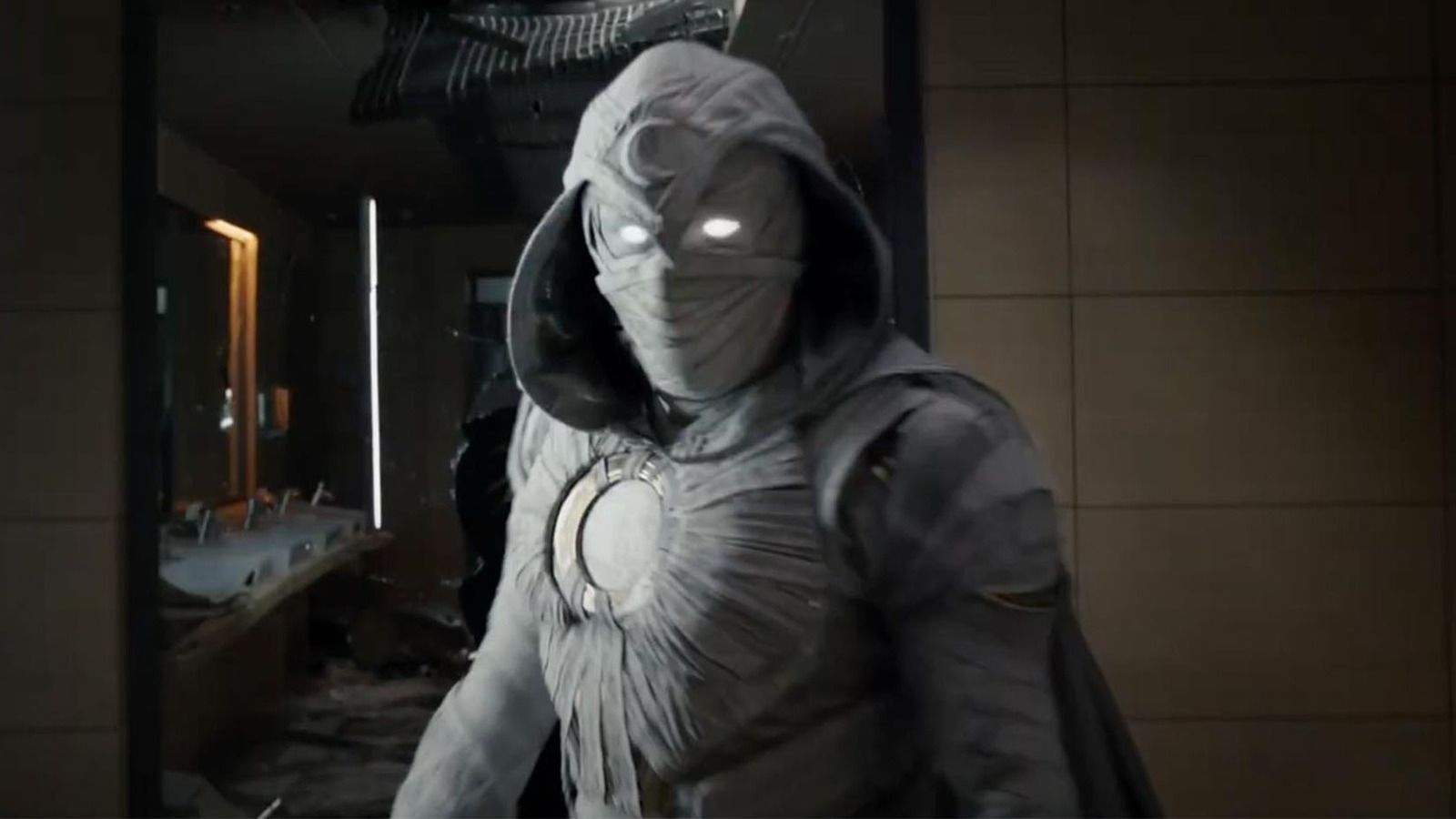
TV REVIEW: Moon Knight S1E1: “The Goldfish Problem”
Moon Knight was the one MCU series on Disney+ that I most looked forward to, but it also the one that I had the most apprehension about. On the one hand, Moon Knight has the potential to be one of the most fascinating characters in the MCU if done correctly. Oscar Isaac was a strong choice to play Marc Spector, which alleviated my concerns somewhat as well. On the other, the MCU’s recent track record in adapting characters from the comics has been spotty at best, especially with characters that are not world-recognized icons.
For those unfamiliar with the character of Moon Knight from the comics, elements of the show may not make immediate sense. Marc Spector is a former mercenary who tries to redeem himself from his past sins, dying on the altar of the Egyptian god Khonshu. What happens next is unclear, whether Khonshu resurrects Spector or whether he miraculously survives his apparent death. In either case, Spector vows to become Khonshu’s knight of vengeance, using the name of Moon Knight. Along the way, Spector uses various alternate identities, including millionaire Steven Grant and cab driver Jake Lockley, in his battle against evil. Over time, Spector becomes lost in these identities, possibly driven by his guilt over his past, sublimating his real identity in the false ones he’s established with his mercenary skills. Another important facet of Moon Knight is the fact that Spector is a Jewish man who follows the ways of an Egyptian god, presenting an internal crisis of faith.

The first episode of Moon Knight gets just enough of the basic concept right to work for the show’s purposes, if not enough to capture the full essence of Marc Spector from the comics. The story captures Marc as a mercenary with Dissociative Identity Disorder and his connections with Khonshu, even if it does so in an untraditional way. The show also does a good job of conveying the unease and uncertainty of Marc’s situation, making the viewer wonder how much of what we see on the screen actually happened. The use of the Steven Grant identity as an unreliable narrator, with that unreliability growing as the constructed life around him falls apart, is cleverly done as well. One thing that the show understands about the Moon Knight comics is the psychological drama about whether Khonshu truly exists or whether he is the invention of an unstable mind. The show interprets it almost as a psychological horror, with Moon Knight presented almost as the monster of the series, which is an intriguing take on the idea. There are enough of the core elements present that I can enjoy the show for what it is, and the rest is executed well enough that the story works for what it’s designed to be.
However, Moon Knight does occasionally fall into the trap of recent MCU productions, which is the tendency to rewrite the character to their convenience rather than adapt the character presented in the comics. With Moon Knight, we see this with the system of alters. Steven Grant in the comics is a millionaire playboy, an identity that Marc uses to finance his work as Moon Knight. The Grant in this show is closer to a Disney character, designed to be closer to an everyman hero who can provide comical reactions to the events around him. Aside from his knowledge of Egyptian mythology, Grant comes across as unassertive and ineffectual, presumably as to humanize Marc and serve as a contrast. While the Marc identity seems largely true to the comics (his Jewish roots being swept under the rug aside), we see little of him for most of the episode. But changing the Grant identity seems unnecessary, as Marc already has plenty of flaws to keep the character interesting. In fairness, though, the Grant in this episode works well for what the story requires, and he’s an engaging enough character that makes the psychological drama and horror work.

Beyond that, the first episode works at setting up the main conflicts of the series and presenting the antagonist of the series. The cuts between the Grant identity segments, with the missing gaps of time of Marc being in control, heightens the sense of surrealism and uncertainty. Much of this is done with effective editing of these scenes and some good shots of surrounding details. Even if we don’t see what Marc does as Moon Knight, we see his handiwork through visual elements, allowing the viewer to fill in those blanks. Arthur Harrow is significantly different from the comics as well, but the cult leader angle and his ideology are compelling enough to see where he develops as a villain. The idea of a villain who advocates the punishment of pre-crime as opposed to the justice represented by Khonshu raises interesting moral questions as well as a promising conflict with Moon Knight.
In terms of the cast, the most compelling figures are the main hero and villain, played by Oscar Isaac and Ethan Hawke. From the moment he was announced, I felt that Oscar Isaac was a good choice for Marc Spector, and we see that during the brief moments where he plays the Marc personality. When we finally see Oscar Isaac truly become Moon Knight on screen, it’s a satisfying moment; Isaac captures the dark edge and the grim determination of Moon Knight when he takes on that persona. He plays Steven Grant as a noticeably second character, with a different accent and mannerisms. Isaac shows some real range in his acting as Grant, showing the fear and confusion as he tries to understand himself. Ethan Hawke is an actor that I’ve long respected as a fan of films like Gattaca, and his Arthur Harrow is a memorable character in his scenes opposite Isaac. Hawke shows some real charisma that makes him a convincing cult leader, and he comes off as an atypical villain. At this point, Harrow comes across as a true believer in himself and his own cause, and Hawke’s delivery makes him seem like a man with real but dangerous conviction. Where Isaac as Grant shows doubt and uncertainty, Hawke as Harrow seems to know exactly who he is, giving the two performances a good contrast as opposing forces. Beyond that, the standout characters are shown in this episode through voice performances. May Calamawy plays the voice of Layla, who is presumably a stand-in for Marlene Alraune, Marc’s main love interest in the comics. The character of Khonshu is portrayed on screen by Karim El-Hakim, who looks imposing and powerful when he’s shown. However, veteran actor F. Murray Abraham is an inspired choice as the voice of Khonshu, and Abraham makes the moon god an imposing and frightening presence in the brief moments he gets to speak in the role.

Although there are elements of Moon Knight that I take issue with as a fan of the character, the first episode is a good start to the series. The episode gets the character down just well enough to make the liberties it takes more forgivable, and what it does introduce is interesting enough to keep watching. The Arthur Harrow character in the show is a compelling villain, and the psychological horror approach makes for an intriguing superhero show. As a whole, there are enough worthwhile pieces here to build on, and hopefully Disney will build on them in a satisfying way.
Score: 4/5
Director: Mohamed Diab
Writer: Jeremy Slater
Cast: Oscar Isaac, Ethan Hawke, May Calamawy, Karim El-Hakin, F. Murray Abraham
Author Profile
- Steve Sellers had been a fan of superheroes ever since Superman: The Movie. But it took the JSA, the Legion of Super-Heroes, Dragonlance, Lord of the Rings, Twilight Zone, and Chris Claremont's legendary run on the X-Men to make him a writer and a longtime fan of comics, fantasy, and science fiction. Steve is the co-creator of WHITE DRUID & MICHAEL NERO and GUARDIANS OF ELAYIM for Omen Comics, and he is also the creator of BLITZ and SHOCKWAVE for Revelation Comics (an imprint of Omen Comics).










